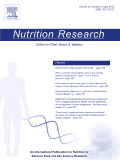
NUTRITION RESEARCH
Scope & Guideline
Connecting Researchers to Shape the Future of Nutrition
Introduction
Aims and Scopes
- Nutritional Epidemiology:
Investigates the relationship between dietary patterns and health outcomes, utilizing large-scale population studies to draw connections between nutrition and disease prevalence. - Clinical Nutrition:
Focuses on the application of nutrition science in clinical settings, exploring dietary interventions for managing chronic conditions such as diabetes, obesity, and cardiovascular diseases. - Nutritional Biochemistry and Metabolism:
Explores the biochemical mechanisms through which nutrients affect metabolic pathways, emphasizing the interaction between diet, metabolism, and health. - Food Science and Technology:
Examines the properties and safety of food products, including the effects of food processing on nutrient availability and the development of functional foods. - Public Health Nutrition:
Addresses the role of nutrition in public health initiatives, emphasizing dietary guidelines, food policy, and community-based interventions to improve population health. - Nutritional Interventions and Supplementation:
Evaluates the efficacy of dietary supplements and functional foods in enhancing health outcomes and preventing nutritional deficiencies. - Food Security and Sustainability:
Investigates the socio-economic aspects of nutrition, including food accessibility, dietary practices, and the environmental impact of food systems.
Trending and Emerging
- Functional Foods and Nutraceuticals:
There is an increasing emphasis on the health benefits of functional foods and nutraceuticals, with research focusing on the mechanisms by which these foods can prevent disease and improve health outcomes. - Gut Microbiome and Nutrition:
The connection between diet and gut microbiome health is a rapidly growing area of interest, highlighting the importance of microbial diversity in relation to nutrition and metabolic health. - Sustainable Diets and Food Systems:
Research is increasingly addressing the sustainability of food systems, exploring how dietary choices impact environmental health and the global food supply. - Personalized Nutrition:
The concept of personalized nutrition, which tailors dietary recommendations based on individual genetic, metabolic, and lifestyle factors, is gaining attention as a means to optimize health outcomes. - Nutrition and Mental Health:
There is a rising interest in the relationship between nutrition and mental health, investigating how dietary patterns may influence mood, cognition, and mental well-being. - Dietary Patterns and Chronic Disease Prevention:
Emerging studies focus on holistic dietary patterns rather than individual nutrients, examining how comprehensive eating habits can reduce the risk of chronic diseases.
Declining or Waning
- Traditional Dietary Practices:
Research on traditional diets and their health benefits has seen a decrease, possibly due to the increasing globalization of food consumption and a focus on modern dietary patterns. - Micronutrient Deficiencies:
While still important, studies specifically targeting micronutrient deficiencies in isolated populations are appearing less frequently, as attention shifts towards broader dietary patterns rather than individual nutrient deficiencies. - Animal-Based Diets:
The exploration of the health impacts of animal-based diets is declining as plant-based diets gain popularity and are increasingly emphasized in nutrition research. - Nutritional Myths and Misconceptions:
Research aimed at debunking nutritional myths has decreased, likely due to a more mature understanding of nutrition science and a focus on evidence-based dietary recommendations.
Similar Journals
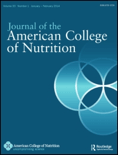
JOURNAL OF THE AMERICAN COLLEGE OF NUTRITION
Pioneering Discoveries in Nutritional ScienceThe Journal of the American College of Nutrition, published by Routledge Journals, Taylor & Francis Ltd, is a respected platform in the fields of Nutrition and Dietetics as well as Medicine. With an ISSN of 0731-5724 and an E-ISSN of 1541-1087, this journal plays a pivotal role in disseminating cutting-edge research and innovative practices related to nutritional science and health. Recognized for its significant impact, it holds a Q2 ranking in both Medicine (miscellaneous) and Nutrition and Dietetics, positioning it in the 86th and 85th percentiles respectively among global publications. Although the journal's coverage in Scopus has been discontinued as of 2021, it continues to serve the academic community by providing access to key studies and impactful findings. Based in the United Kingdom, this journal aims to bridge the gap between research and practice, supporting professionals, researchers, and students in advancing their understanding of nutrition's critical role in health and disease management.
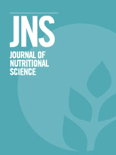
Journal of Nutritional Science
Promoting open access to vital nutrition research.The Journal of Nutritional Science, published by Cambridge University Press, is a leading open-access journal dedicated to the field of nutrition and dietary research. Established in 2012, this journal aims to disseminate high-quality research on nutrition, dietetics, and their implications for health and disease. With an impact factor reflective of its growing importance—holding Q2 and Q3 rankings in relevant categories such as Nutrition and Dietetics and Endocrinology—the journal serves as a vital platform for researchers, professionals, and students interested in evidence-based advancements within the nutritional sciences. The Journal of Nutritional Science is based in the United Kingdom and leverages a global network of experts to foster discussions that drive innovation in food science and health policies. By enabling open access to its content, it ensures that critical knowledge is readily available to the academic community and beyond, promoting a healthier, more informed society.
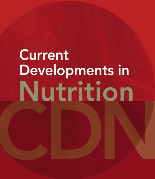
Current Developments in Nutrition
Unlocking the future of dietary research.Current Developments in Nutrition is a prominent open-access journal published by Elsevier Science Inc, specializing in the field of nutritional science. With an ISSN of 2475-2991, this journal has been contributing valuable insights to the scientific community since its inception in 2017, and continues to shape research narratives through 2024. It boasts impressive rankings in the 2023 quartiles, achieving Q1 in Food Science and Q2 in both Medicine (miscellaneous) and Nutrition and Dietetics, highlighting its critical role in advancing knowledge in these areas. The journal is particularly noted for its commitment to disseminating cutting-edge research that influences dietary practices and public health policies. With Scopus rankings placing it in the 75th percentile in Medicine and the 68th percentile in Food Science, Current Developments in Nutrition serves as an essential resource for researchers, healthcare professionals, and students who seek to stay at the forefront of nutrition science. Its open-access model ensures that groundbreaking studies are available to a global audience, further enhancing collaboration and innovation across disciplines.
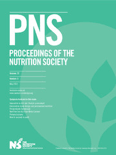
PROCEEDINGS OF THE NUTRITION SOCIETY
Leading the Charge in Nutritional Knowledge and PracticePROCEEDINGS OF THE NUTRITION SOCIETY, published by Cambridge University Press, stands as a leading forum for the dissemination of cutting-edge research in the fields of Nutrition and Dietetics as well as broader medical sciences. With an impressive impact factor and ranked Q1 in both its categories, the journal has established itself at the forefront of nutritional research since its inception in 1944. The journal aims to foster scientific discourse and innovation, presenting a variety of original research articles, reviews, and clinical guidelines that are invaluable to researchers, practitioners, and students alike. Although it is not an open-access publication, access options are available for institutions and individuals, ensuring a wide reach for groundbreaking studies. As a vital resource, PROCEEDINGS OF THE NUTRITION SOCIETY invites submissions that advance understanding of nutritional science, contribute to public health advancements, and promote evidence-based dietary practices.

EUROPEAN JOURNAL OF NUTRITION
Elevating Global Health through Nutritional InsightsEuropean Journal of Nutrition, published by Springer Heidelberg, is a premier outlet for groundbreaking research in the field of nutrition and dietetics. Established in 1996 and set to continue its impactful legacy until at least 2024, this journal enjoys an impressive recognition, holding a Q1 category rank in both Medicine (miscellaneous) and Nutrition and Dietetics, with notable Scopus rankings that place it in the top 10% of its field. The journal facilitates open access options, enhancing the dissemination of knowledge across the globe. It serves as a vital platform for researchers, healthcare professionals, and students, promoting the exchange of innovative ideas and advancements in nutritional science that aim to improve health outcomes worldwide. With a commitment to quality and relevance, the European Journal of Nutrition continues to shape the future of nutrition research and practice.
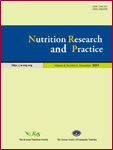
Nutrition Research and Practice
Connecting science and practice for global nutrition.Nutrition Research and Practice is a prominent journal dedicated to advancing the field of nutrition and dietetics, published by the esteemed Korean Nutrition Society. With a focus on high-quality research and practical applications, this journal serves as a vital platform for scholars and professionals to disseminate new findings in the interdisciplinary realms of food science and nutrition. The journal boasts an impressive 2023 impact factor, categorizing it in the Q2 quartile in Food Science and Q3 in Nutrition and Dietetics, illustrating its significant reach and impact among peers. Despite being a non-open access publication, it continues to draw attention with its rigorous peer-review process, ensuring that only the most relevant and innovative contributions are shared. With coverage from 2010 to 2024, the journal not only supports a wealth of research but also aims to influence dietary practices and policies in South Korea and globally. Located in the heart of Seoul, Nutrition Research and Practice is an essential resource for researchers, practitioners, and students seeking to deepen their understanding of nutrition and improve public health outcomes.

NUTRITION
Unraveling the complexities of nutrition and wellness.NUTRITION is a prestigious peer-reviewed journal published by Elsevier Science Inc, dedicated to advancing the field of dietary practices and metabolism. With an ISSN of 0899-9007 and an E-ISSN of 1873-1244, this journal has been serving the academic community since its inception in 1987, showcasing high-quality research and reviews through 2024. Recognized for its significant contributions to the fields of Endocrinology, Diabetes and Metabolism and Nutrition and Dietetics, NUTRITION holds a commendable Q2 category ranking in both areas, reflecting its impactful presence with a Scopus rank of #26 out of 140 and #51 out of 244 in its respective categories. The journal primarily aims to disseminate innovative research findings that illuminate the complex interplay between nutrition and health, fostering a deeper understanding among researchers, healthcare professionals, and students alike. By bridging scientific inquiry with practical application, NUTRITION plays a vital role in shaping public health policies and dietary recommendations worldwide.

Revista Chilena de Nutricion
Elevating Nutritional Knowledge for Professionals and ScholarsRevista Chilena de Nutrición is a pivotal academic journal dedicated to the fields of nutrition and dietetics, published by the SOC CHILENA NUTRICION, BROMATOLOGIA & TOXICOLOGIA. With its long-standing history, from its inception in 1981 to its contemporary contributions, the journal serves as a crucial platform for the dissemination of research, insights, and advancements within the nutritional sciences. Although currently not listed as Open Access, its articles are accessible to a diverse audience, including researchers, healthcare professionals, and students, all keen on enhancing their understanding of nutrition science. The journal is ranked in the Q3 category in Food Science and Q4 in Nutrition and Dietetics for 2023, indicating its growing reputation and respectable position in the scholarly community. With Scopus rankings of #281 in Food Science and #106 in Nutrition and Dietetics, the Revista Chilena de Nutrición remains essential for those wishing to remain at the forefront of evidence-based nutritional research and practice.

Nutrients
Elevating the discourse in food science and nutrition.Nutrients is a premier, peer-reviewed open access journal published by MDPI, dedicated to advancing the field of nutrition and dietary research. Since its inception in 2009, this journal has consistently garnered acclaim, achieving a Q1 ranking in both Food Science and Nutrition and Dietetics, reflecting its significant impact in these vital areas of study. With a robust Scopus ranking of #40 out of 389 in Food Science and #18 out of 140 in Nutrition and Dietetics, Nutrients has established itself as a leading platform for researchers, practitioners, and students aiming to share and gain insights into nutritional epidemiology, dietary interventions, and policy implications. Hailing from Basel, Switzerland, the journal ensures broader accessibility through its open access model, inviting diverse contributions that enhance our understanding of nutrition in health and disease. By fostering collaboration across disciplines, Nutrients not only serves as a resource for high-quality research but also encourages innovation essential for tackling global nutritional challenges.
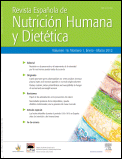
Revista Espanola de Nutricion Humana y Dietetica
Connecting researchers and practitioners in dietetics.Revista Espanola de Nutricion Humana y Dietetica is a pivotal open-access journal dedicated to advancing the study of human nutrition and dietetics. Published by the ASOC ESPANOLA DIETISTAS NUTRICIONISTAS in Spain, this journal has been making significant contributions to the field since its inception in 2011. With an ISSN of 2173-1292 and an E-ISSN of 2174-5145, it provides researchers and practitioners with a valuable platform for disseminating innovative research, case studies, and reviews related to nutrition science. Although currently ranked Q4 in both Food Science and Nutrition and Dietetics categories (2023), the journal is committed to raising its academic profile by fostering high-quality publications that address contemporary issues in nutrition. Open access since 2012, it ensures that research is readily available to a global audience, thus promoting the exchange of knowledge and best practices. Emphasizing the importance of dietary interventions and public health nutrition, the journal encourages contributions that bridge theory and practical applications, appealing to a broad spectrum of professionals, researchers, and students within the field.